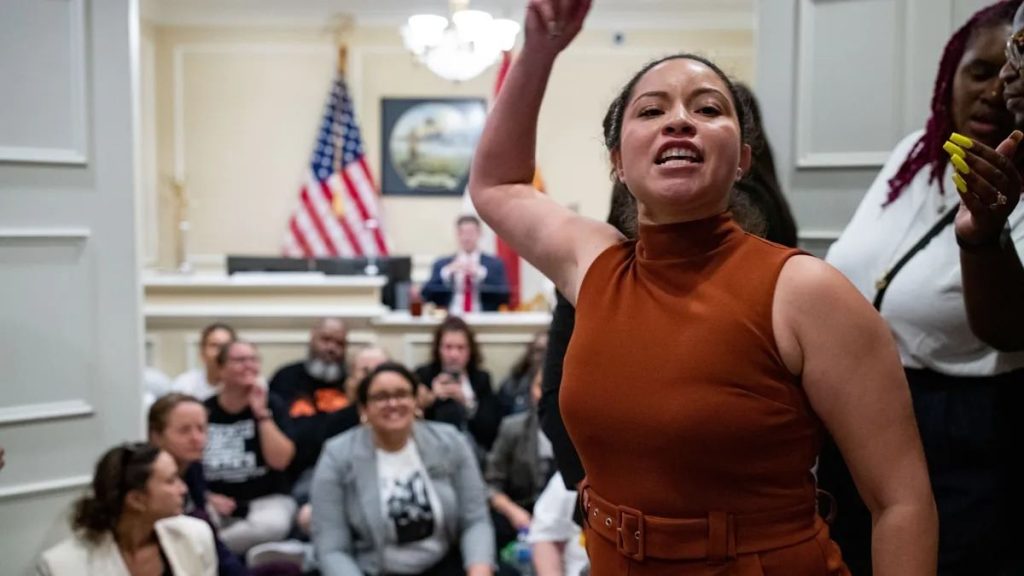15 de julio 2023

Children of Exile: The Births “Sowing Hope” in the Camp of Nicaraguan Farmers

PUBLICIDAD 1M
PUBLICIDAD 4D
PUBLICIDAD 5D
Hundreds of migrants have opted to move to other states. The construction trade has been one of the most affected sectors

Yareliz Méndez, of the Florida Immigrant Coalition. Photo: Taken from Internet
On July 1, 2023, a law went into effect in Florida that harshly punishes immigrants without legal immigration status. The controversial measure promoted by Republican Governor Ron DeSantis has been widely criticized for “violating the human rights” of the immigrant community.
“It’s a law that affects all aspects of the lives of immigrants and their families,” affirmed Yareliz Mendez from the Florida Immigrant Coalition. She spoke in an interview with the online television news show Esta Noche, which airs on YouTube and Facebook Live.
The new law makes it difficult for immigrants living in Florida to obtain employment and to move around. Many are chosing to leave the state out of fear of being deported.
During the month preceding the measure’s full implementation, some economic sectors held one-day work stoppages, while other Florida cities were the site of protest marches. “Florida is rising up against this law, because we recognize that the immigrant community is crucial to the state,” Mendez stressed.
How does this law affect migrants’ employment and mobility?
Yareliz Mendez: The new law affects all aspects of life. It requires employers with 25 or more employees to utilize the E-Verify system to confirm whether a person is legally authorized to work in the United States; it also forces hospitals and emergency departments to record a patient’s immigration status. it even penalizes people who are traveling with someone lacking legal immigration status with up to 15 years in prison, with no exceptions for family members. In addition, it prohibits the financing of programs that provide what’s known as “Community IDs” – which previously allowed homeless people or undocumented immigrants to establish that they resided within a certain county. It invalidates any driver’s licenses issued legally by another state to those with irregular immigration status. Currently, nineteen states offer driver’s licenses to undocumented immigrants, but under the new policy, these would be considered completely invalid in Florida.
This law has generated a lot of fear among immigrants in Florida. Some have even chosen to leave the state. Is it known how many migrants have left Florida since this measure went into effect?
We don’t have an exact count of families that have fled the state, but our organization maintains a helpline, and every day we receive calls from undocumented immigrants who are fearful, and who ask us how they can move out of state. We also have member organizations that work in other counties, and they’re also seeing the same thing.
What impact is this having on Florida’s productive economy? What are the most affected industries?
The most affected industries are agriculture, construction, and hotels. Even before the law went into effect, people were aware of it, and some out-of-state truckers threatened to boycott Florida and not drive their trailer trucks there in protest. Several work stoppages were called through social networks. The first was held on June 1, 2023. According to reports, that day the construction (industry) in the city of Orlando was reduced to 50% capacity. There were marches of more than six thousand people in the city of Immokalee. Florida is standing up against this law, because we recognize that the immigrant community is crucial to the state.

The measure contemplates 12 million dollars to relocate immigrants from Florida to other states. What will be the process for these relocations?
There’s not really an understandable process. What we’re seeing is that the governor’s office lies to people who’ve crossed the border irregularly, telling them they’ll send them to another city where they’ll have housing, food, work. But the city they send them to isn’t necessarily where the person wants to go.
What are the most affected immigrant communities? Are Central Americans and Nicaraguans affected?
Florida is known as a “mini Latin America.” We have a very large population of Nicaraguans, Hondurans, Salvadorans, Colombians, Haitians, Dominicans, and all of them are feeling harmed by this law.
How many undocumented immigrants do you think this measure could affect?
There are over 11 million people in the United States who are waiting for some type of relief in their immigration status. If any one of these people were to enter Florida, they could find themselves harmed. It’s important to recognize that this law is now being replicated in other states – in Kansas, for example, and there are rumors that Texas, Arizona and Georgia are all considering the passage of similar anti-immigrant laws.
Right now, we’re waiting for the Biden administration to approve a new TPS [Temporary Protective Status, a benefit that allows certain immigrants to remain in the US when conditions in their country temporarily prevent them from returning safely] like the case of Nicaragua. TPS protects an immigrant from deportation, allows them access to a work permit, and the possibility of getting a driver’s license.
Florida governor Ron DeSantis, the chief promotor of this controversial law, argues that the law is aimed at combatting human trafficking. Is DeSantis actually seeking to win electoral support with these measures?
Absolutely. He’s been pushing this law in order to score political points with communities that don’t like immigrants. But it’s not only the governor – the Florida state representatives have also pushed this measure. Instead of focusing on the problems that really afflict Florida, like the housing crisis, they decided to approve this law, even though the community didn’t want it.
What’s the future for Nicaraguan and Latin American immigrants in Florida, in the face of this measure? What are their options?
First, they should know that they still have constitutional rights that the Florida governor and legislature can’t take away from them. For example, the right to speak with their country’s consul; the right to refuse to sign something they don’t understand; the right to remain silent; the right to a lawyer. It’s important to know all that. Those who are immigrants aren’t alone, there are organizations that are raising their voices in rejection of the law.
This article was originally published in Spanish in Confidencial and translated by Havana Times.
PUBLICIDAD 3M
Periodista y productora audiovisual nicaragüense. Licenciada en Ciencias Políticas. Cofundadora de varias organizaciones de sociedad civil vinculadas a la lucha por los derechos de la comunidad estudiantil en Nicaragua. También se ha desempaño en proyectos de transformación digital para empresas y organizaciones.
PUBLICIDAD 3D